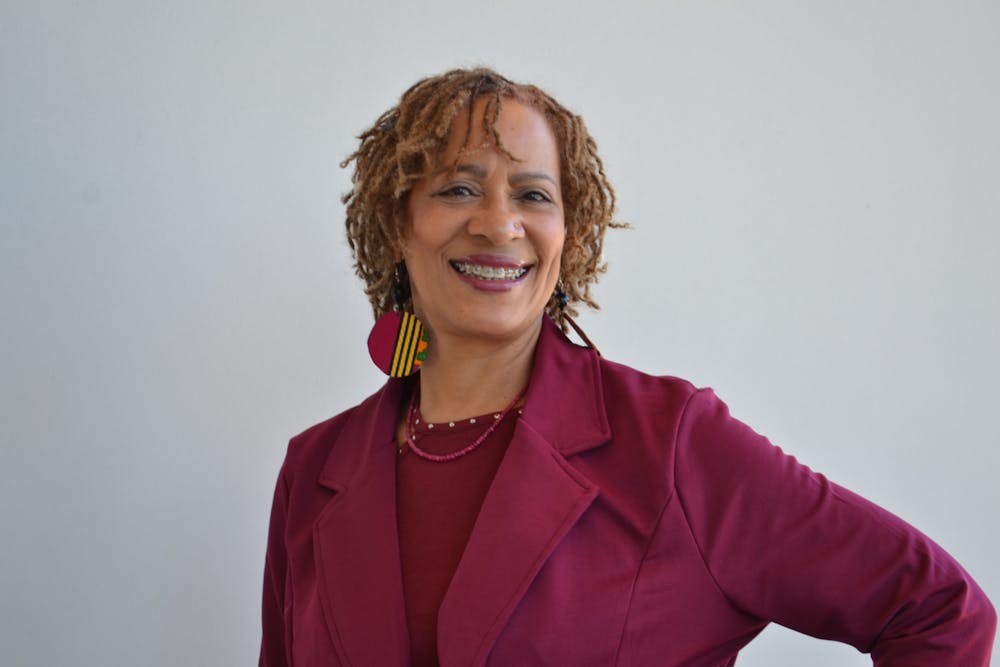The campaign headquarters is a squat, square brick building on a stretch of East Main Street between Rustic Rays Bargain Boutique and the School of Hard Knocks Boxing Gym. It would be easy to miss, except for the sky-blue “Elaine O’Neal For Mayor” signs plastered in neat vertical rows on the front.
On a recent Tuesday, O’Neal parks her navy SUV outside her headquarters and ushers me into the long, fluorescent-lit room. She wears a white blouse and black slacks, and her dreadlocks are dyed to a light caramel color.
“I haven’t been up here in two to three days,” she says. “C’mon in.”
There are a few tables covered with campaign flyers, t-shirts and buttons. A lawnmower is nestled against a small bathroom in the back, and a couple maps of Durham County’s voting precincts hang on the wall.
The day before, Javiera Caballero, the other general election candidate, suspended her mayoral campaign after primary results were announced. She received about 25% of the vote, while O’Neal received roughly 68%. This left O’Neal poised to become the first Black female mayor of Durham.
‘She knows Durham, and … Durham knows her’
O’Neal is a different kind of candidate, without much traditional political experience—her only campaigns prior to this have been for district court and superior court judge. She hasn’t served on Durham City Council like Caballero and outgoing Mayor Steve Schewel have done.
But O’Neal’s supporters believe the lifelong Bull City resident knows Durham like nobody else. To them, the person most qualified to help run the city is the person nurtured and trained by the city—the self-proclaimed “daughter of Durham.”
“I'm pretty sure she knows everybody in Durham. Or if she doesn't, she knows somebody who knows them,” said Kaaren Haldeman, who worked with O’Neal on Durham’s Racial Equity Task Force. “The stories that she can tell, the understanding that she has of the rhythm of the city, how the rhythm of the city has changed over time, she’s watched it cycle through success and failure and dark times and bright times. She really is a living oral history of the city.”
“She knows Durham, and to a large extent, Durham knows her,” said former Durham Mayor Bill Bell.
O’Neal wants her headquarters on East Main Street to be a base for outreach into the surrounding community, even if the area isn’t always safe. Two months ago, a young man was murdered at the Durham Convenient Tobacco store across the street.
She points a finger at a group of people hanging out on a patch of grass. They are all Black, and many of them are in wheelchairs.
“I would love for this to be a safe space for that group that hangs out up there,” she says.
Her “street cred,” derived from decades of experience as a judge in the Durham County Courthouse and in the community, is what sets O’Neal apart from previous mayors or the other candidates, said Shane Jones, one of O’Neal’s friends. Durhamites who feel left behind identify themselves with her.
“With the headquarters right there, she can just walk across the street and start talking to people, and that’s an area that a lot of people are concerned about. It’s a rough area, and she can just walk across the street and start chatting to people,” Jones said.
O’Neal grabs a can of ginger ale and shows me a board with several photos from her previous campaigns for district court and superior court judge. One of them has a caption underneath her photo: “Durham has been good to me and I want to continue to be good to Durham. I am a child of the village.”
‘It was a real community’: Growing up
Born in 1962, O’Neal grew up as the youngest of five children in Durham’s West End, a neighborhood where people came out and sat on their porches in the evenings, where the kids played touch football and hopscotch in the streets. Friday nights meant baseball games at Lyon Park.
“It was a real community, where you actually knew your neighbors,” O’Neal says.
Her family were regular attendees at the local church, where she “learned how to beat a mean tambourine.” She still plays tambourine, sings and dances in her spare time and keeps music playing at all hours of the day.
She graduated from Hillside High School and landed a scholarship at North Carolina Central University, where she graduated with a bachelor of science in math in 1984. After earning a law degree from NCCU School of Law—she has also worked for two years as interim dean of the law school—she ran for district court judge in Durham County, enlisting her older brother and sister to help run her campaign.
“We didn’t know what we were doing—grassroots all the way,” said Eunice Sanders, O’Neal’s sister. “We just did what came natural. We went to our base community, our church, our jobs, to get people out to vote for her. And somehow she won.”
O’Neal served as district court judge from 1994 to 2011 and as superior court judge from 2011 to 2018. During those years, she saw the people of Durham up close.
“You get to learn and observe human behavior. You get to know people. You saw people in the worst of circumstances and the best of circumstances,” she says.
The campaign for mayor
When O’Neal decided she wanted to run for mayor, she turned to her siblings again for help.
“We were like, ‘Running for mayor, are you kidding us?’” Sanders said. “Because we were all retired, we didn’t want to do this, we pushed back real hard. But we saw it was something that she wanted to do. She said it was a God-sent job for her, and we saw that she was very determined to do it.”
Though O’Neal has a professional campaign manager, her campaign still has a homespun feel. Many of the staff and volunteers are Black women, and most are family and friends: women from church, old Hillside High classmates and her big sisters, who still boss her around sometimes.
“I was talking to somebody the other day, and I was like, ‘In my family, I’m still the baby, I don’t make the decisions, the older ones really run the show,’” O’Neal says, chuckling.
‘For every child of Durham to have that experience’
On a recent Saturday afternoon, O’Neal and a group of volunteers set up tables outside her headquarters to hand out chicken meals to the community. Wearing a Hillside High School reunion t-shirt, O’Neal weaves through the group, laughing and chatting. At one point, her sister-in-law stops by, and O’Neal grins and bursts into song: “Happy birthday, happy birthday to you. That’s my sister-in-law, happy birthday sis.”
An older Black woman in gray sweatpants and with bandages on her left arm approaches O’Neal.
“I hope you become mayor, because I did vote for you,” the woman says.
“You got to vote again, early voting going on right now,” O’Neal says. The woman shouts to her friend across the street: “she said early voting going on right now!”
“I’m going to go lay down for a minute, child,” the woman says, trudging away.
“I’ll bring y’all food over there,” O’Neal says. “I’ll get somebody to bring you two plates. Go lay down, get off your feet. Go lay down. Okay, babe.”
O’Neal sees this moment as a pivotal time for Durham: crime is up, affordable housing is a scarce commodity and people are divided. Inequality festers throughout the city.
“The disparities between the two Durhams, and Main Street is a perfect example of it. I saw a very different Durham growing up. That’s why I’m here. We were more united. Neighbors knew each other. People really spoke into your life,” she says.
The top issues on her platform—from neighborhood safety and affordable housing to economic recovery and youth engagement—are oriented around her larger goal of making Durham a place where everyone belongs.
Can she pull it off?
“That is what I’m hoping to do, is get us to a point where we can reunite as one, like I did when I was on the West End. We were raised by the whole community, and that is my desire, for every child of Durham to have that experience,” she said at a recent candidate forum. “I can tell you it’s not rocket science for us to fix it. But it is going to take a community effort, and it is going to take leadership to be able to move us forward, and I believe I can be that leader.”
This is the vision offered by the child of the village: West End community building at a city-wide scale.
Get The Chronicle straight to your inbox
Signup for our weekly newsletter. Cancel at any time.

Chris Kuo is a Trinity senior and a staff reporter for The Chronicle's 118th volume. He was previously enterprise editor for Volume 117.

